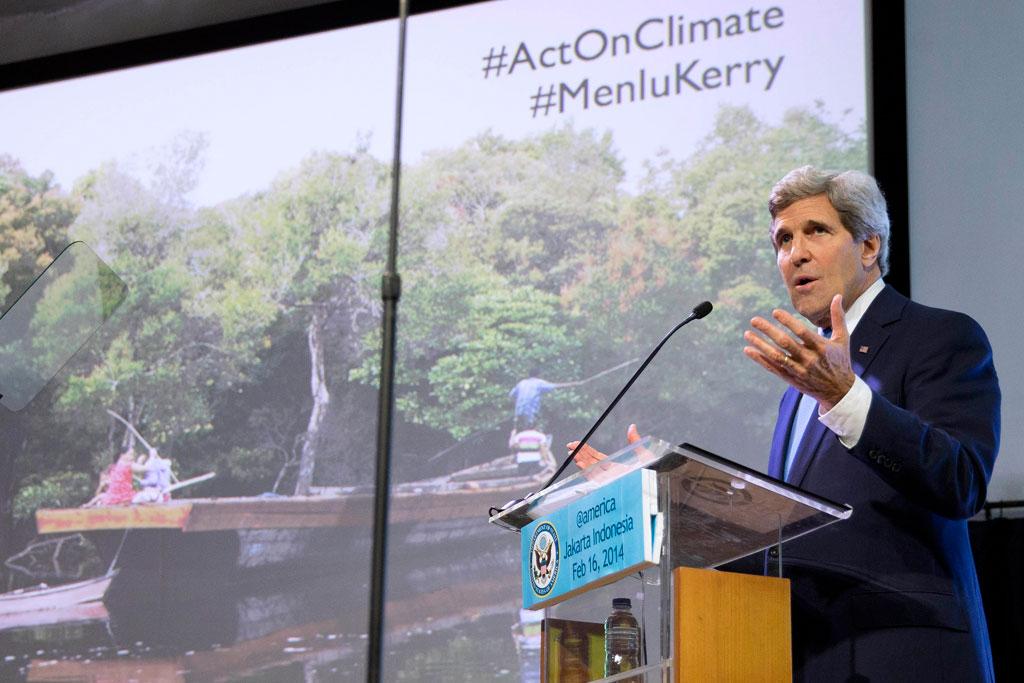US Secretary of State John Kerry calls climate change ‘weapon of mass destruction’
US Secretary of State John Kerry gestures during a speech on climate change in Jakarta on Feb. 16, 2014.
US Secretary of State John Kerry warned Indonesians on Sunday that man-made climate change could threaten their entire way of life, deriding those who doubted the existence of "perhaps the world's most fearsome weapon of mass destruction".
Kerry described those who do not accept that human activity causes global warming as "shoddy scientists" and "extreme ideologues," and said big companies and special interests should not be allowed to "hijack" the climate debate.
Aides said Kerry had chosen Indonesia for the first of what is to be a series of speeches on the topic this year partly because, as an archipelago of more than 17,000 islands, it is particularly at risk from rising sea levels.
"Because of climate change, it's no secret that today Indonesia is … one of the most vulnerable countries on Earth," Kerry told an audience of students at a high-tech US-funded cultural center at a Jakarta mall.
"It's not an exaggeration to say that the entire way of life that you live and love is at risk."
In the middle of a trip to Asia and the Middle East, Kerry argued that it made no sense for some nations to act to stem climate change while others did nothing.
More from GlobalPost: Calamity Calling: A GlobalPost investigation into global climate change
"Think about the proliferation of weapons of mass destruction. It doesn't keep us safe if the United States secures its nuclear arsenal while other countries fail to prevent theirs from falling into the hands of terrorists," he said.
"The bottom line is this: it is the same thing with climate change. In a sense, climate change can now be considered another weapon of mass destruction, perhaps even the world's most fearsome weapon of mass destruction."
Kerry's public push takes place against a backdrop of a negotiation among nearly 200 nations about a possible new global treaty on climate change that is scheduled to be agreed next year and to address greenhouse gas emissions from 2020.
US-Chinese Cooperation
In Beijing on Friday, Kerry announced that China and the United States, the world's largest emitters of such gases, had agreed to intensify information-sharing and policy discussions on their plans to limit greenhouse gas emissions after 2020.
US officials made clear they hope that the example of two countries historically on different sides of the debate working together might inspire other nations to do more.
The global scientists of the Intergovernmental Panel on Climate Change have said it is at least 95 percent probable that human activities, led by the burning of fossil fuels, are the dominant cause of global warming since the 1950s.
However, some skeptics argue that a rise in global temperatures is due to natural variability or other non-human factors.
The fact that temperatures have risen more slowly in the past 15 years despite a continued rise in greenhouse gas emissions has also emboldened those who question the need for urgent action.
Kerry, who faces a politically tricky decision at home on whether to allow Canada's TransCanada Corp to build the Keystone XL pipeline over the opposition of environmental groups, had little patience for such skeptics in his speech.
"We just don't have time to let a few loud interest groups hijack the climate conversation," he said. "I'm talking about big companies that like it the way it is, that don't want to change, and spend a lot of money to keep you and me and everybody from doing what we know we need to do.
"We should not allow a tiny minority of shoddy scientists … and extreme ideologues to compete with scientific fact," he said. "The science is unequivocal and those who refuse to believe it are simply burying their heads in the sand."
(Reporting By Arshad Mohammed; Editing by Kevin Liffey)
We want to hear your feedback so we can keep improving our website, theworld.org. Please fill out this quick survey and let us know your thoughts (your answers will be anonymous). Thanks for your time!
